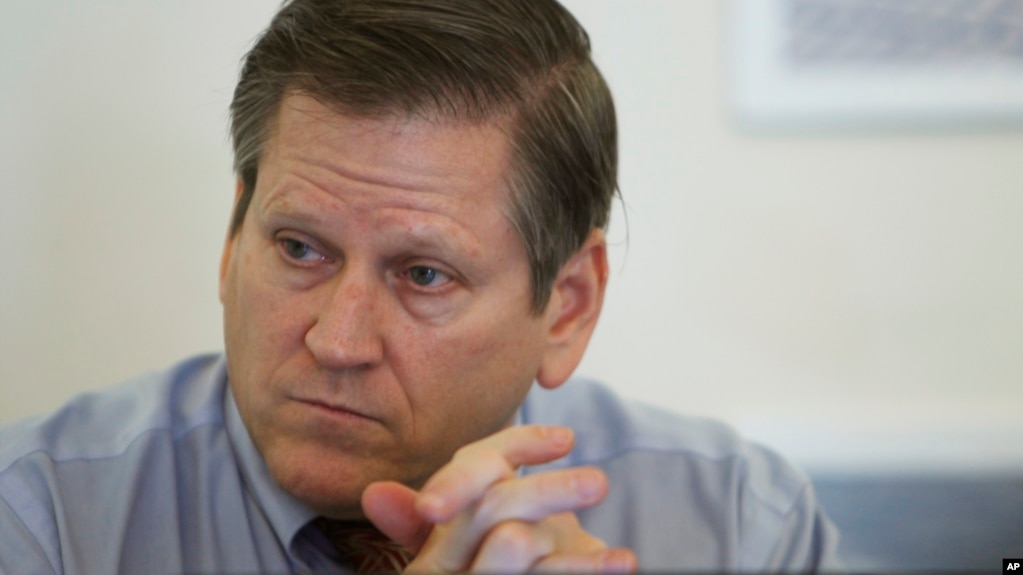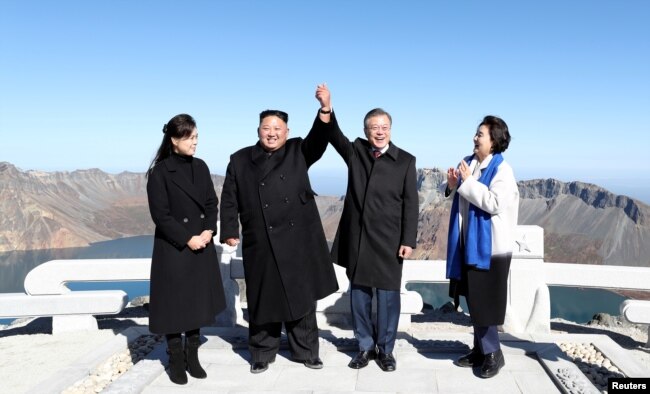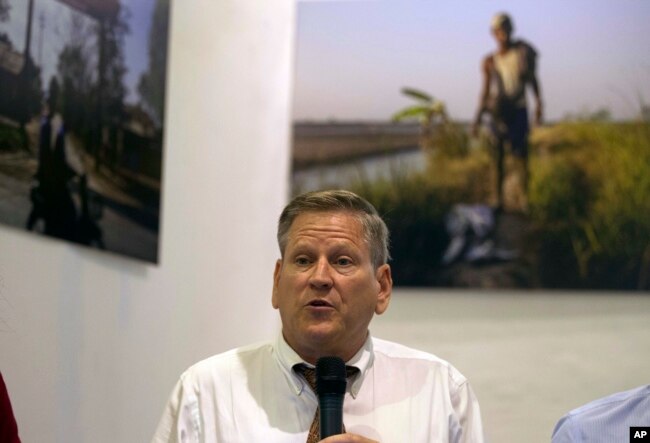
FILE - Phil Robertson, deputy director of Human Rights Watch's Asia division, attends a press conference in Phnom Penh, Cambodia, March 12, 2015.
ACTIVISTS CALL FOR NEED TO ADDRESS
NORTH KOREAN HUMAN RIGHTS ABUSES
BY STEVE MILLER
SEE: https://www.voanews.com/a/korean-human-rights-and-unification/4584410.html; republished below in full unedited for informational, educational and research purposes:
SEOUL, SOUTH KOREA —
South Korean President Moon Jae-in claimed success following his three-day summit in North Korea last week, where he was able to secure agreements from North Korean leader Kim Jong Un on a variety of inter-Korean projects and revitalize denuclearization talks. However, as the president openly speaks about a new era of peace and prosperity, absent from the discussion has been the North’s human rights abuses.
A 2014 United Nations Office of Human Rights’ Commission of Inquiry report found “systematic, widespread and gross human rights violations” in North Korea that in many instances constituted crimes against humanity.
“The gravity, scale and nature of these violations reveal a state that does not have any parallel in the contemporary world,” it added, calling North Korea a state that “seeks to dominate every aspect of its citizens’ lives and terrorizes them from within.”
In a statement, South Korea’s presidential office said President Moon will relay the outcomes of the third inter-Korean at the 73rd United Nations General Assembly (UNGA) and plans to work closely with the international community to develop a new vision of peace and prosperity on the Korean peninsula.
Moon’s office added South Korea is ready and willing to assume “key roles on the major issues facing the international society such as peace and security, human rights, development, and humanitarian assistance, and climate change; we would like to increase the cooperation with UN and global society.”
Human rights not part of current discussions
But human rights advocate tell VOA that while positive steps toward peace, reconciliation, and eventual reunification of the peninsula are positive, human rights discussions are not part of the agenda.
Despite the agreements reached between the South and North outlined in the April Panmunjom and September Pyongyang Declarations, Executive director Greg Scarlatoiu with the Committee for Human Rights in North Korea said human rights policies aren’t involved in Seoul's approach to reconciliation with the North.
“There is absolutely no mention of North Korea's abysmal human rights violations,” said Scarlatoiu.
Phil Robertson, Deputy Asia director for Human Rights Watch, did note one exception, "the important humanitarian reunification between the separated families."
South Korea’s Ministry of Unification administers the Council on North Korean Human Rights and “works closely together with other agencies.” The ministry said it will “establish the basic plan for the promotion of human rights in North Korea, and its implementation plan, and carry out relevant policies systematically.”
In an email to VOA, the unification ministry writes, “The government places emphasis on human rights in the notion of universal value and ethnicity, and strives to continuously improve the quality of life for North Koreans.”
“The [Pyongyang] Joint Declaration of September contains numbers of agreements on inter-Korean exchanges and easing military tensions. If the agreements are well carried out, it will contribute to not only the improvement of inter-Korean relations and peace settlement on the Korean peninsula, but also the improvement of human rights of North Korean people,” the message said.
Pressure needed
But rights advocates say more needs to be done and suggest increased international pressure is needed to ensure that in future discussions with North Korea, human rights issues are discussed.
Robertson said that in talks with North Korea, “There has to be a larger context.”
When you talk about “long-term prosperity and peace… getting the North Korea - South Korea issue and Korean reunification right is the key element,” but with a history of severe human rights violations on the peninsula, said Robertson, “Human rights can't just be left off the table.”
Scarlatoiu added that avoiding such topics at the start of negotiations makes it difficult to raise them later.
“I don't know how president Moon is going to move to a position where he raises human rights concerns, after giving all of these speeches lauding the leader of North Korea for his accomplishments,” he said.
While the Ministry of Unification can’t identify specific agenda items for future inter-Korean talks, it said “through the [Panmunjom] Declaration, the government (together with the North) has agreed to endeavor to resolve the humanitarian issues that resulted from the division.”
The unification ministry said the government will “find practical measures to enhance human rights of North Koreans,” although the ministry gave no details on how it plans to achieve that goal.
Robertson asserts there has been a lack of advancement in addressing North Korean human rights issues by the South Korean government.
“The North Korean human rights act was passed by the South Korean Parliament two years ago,” said Robertson, “and still two years later, we have no real progress on implementing key aspects of that law.”
“The ultimate measure of reconciliation, peace, and unification of the Korean Peninsula is going to be the impact it has on the Korean people living in the South and in the North,” said Scarlatiou, adding that those goals should not sacrifice attention to human rights.
Lee Ju-hyun contributed to this report.

